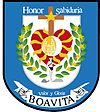Boavita
| Boavita | |||
|---|---|---|---|
| Municipality and town | |||

Church of Boavita
|
|||
|
|||
 Location of the municipality and town of Boavita in the Boyacá department of Colombia |
|||
| Country |
|
||
| Department | Boyacá Department | ||
| Province | Northern Boyacá Province | ||
| Founded | 9 February 1613 | ||
| Government | |||
| • Mayor | Jairo Córdoba Suárez (2016-2019) |
||
| Area | |||
| • Municipality and town | 159 km2 (61 sq mi) | ||
| Elevation | 2,114 m (6,936 ft) | ||
| Population (2015) | |||
| • Municipality and town | 7,079 | ||
| • Density | 45/km2 (120/sq mi) | ||
| • Urban | 2,929 | ||
| Time zone | Colombia Standard Time (UTC-5) | ||
| Website | Official website | ||
Boavita is a town and municipality in the Colombian Department of Boyacá, part of the subregion of the Northern Boyacá Province. The urban centre of Boavita is situated in the Eastern Ranges of the Colombian Andes at an altitude of 2,114 metres (6,936 ft) and a distance of 184 kilometres (114 mi) from the department capital Tunja. The municipality borders Capitanejo, Santander, and the Nevado River in the north, San Mateo and La Uvita in the east, Tipacoque and Soatá in the west and Susacón in the south.
The name of Boavita is derived from Chibcha and doesn't mean "good life", yet "Point on the hill worshipping the Sun" or "Gate of the Sun".
The area of modern Boavita in the times before the Spanish conquest of the Muisca was inhabited by a tribe called "Guavitas", pertaining to the Laches and Muisca. It was ruled by a cacique who was loyal to the Tundama of Tundama.
Modern Boavita was founded on February 9, 1613 by Sr. Hugarte.
Main economical activities of Boavita are agriculture, farming and mining. Main agricultural products cultivated are dates, sugarcane, yuca, coffee, cotton, potatoes, maize, chick peas, beans, peas, wheat and arracacha. The mining activities exist of carbon exploitation.
...
Wikipedia


